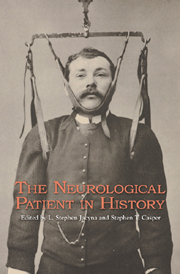Book contents
- Frontmatter
- Contents
- Preface
- Acknowledgments
- Introduction
- Part One Medicine Constructs the “Neurological Patient”
- Part Two Public and Private Constructions of the “Neurological Patient”
- Part Three Patient Groups Construct the “Neurological Patient”
- 5 Disappearing in Plain Sight: Public Roles of People with Dementia in the Meaning and Politics of Alzheimer's Disease
- 6 The Cursing Patient: Neuropsychiatry Confronts Tourette's Syndrome, 1825–2008
- Part Four The Patient Constructs the “Neurological Patient”
- Part Five Historians Construct the “Neurological Patient”
- Bibliography
- List of Contributors
- Index
5 - Disappearing in Plain Sight: Public Roles of People with Dementia in the Meaning and Politics of Alzheimer's Disease
from Part Three - Patient Groups Construct the “Neurological Patient”
Published online by Cambridge University Press: 12 September 2012
- Frontmatter
- Contents
- Preface
- Acknowledgments
- Introduction
- Part One Medicine Constructs the “Neurological Patient”
- Part Two Public and Private Constructions of the “Neurological Patient”
- Part Three Patient Groups Construct the “Neurological Patient”
- 5 Disappearing in Plain Sight: Public Roles of People with Dementia in the Meaning and Politics of Alzheimer's Disease
- 6 The Cursing Patient: Neuropsychiatry Confronts Tourette's Syndrome, 1825–2008
- Part Four The Patient Constructs the “Neurological Patient”
- Part Five Historians Construct the “Neurological Patient”
- Bibliography
- List of Contributors
- Index
Summary
One of the most striking aspects of the rise of Alzheimer's disease (AD) since the 1970s has been the emergence of people with dementia publicly speaking for themselves about their illness and about the meaning of dementia. Of course, exemplary disease victims have been part of the modern cultural landscape throughout the twentieth century, both reflecting and shaping the development of medicine and the experience of illness. But the nature of AD and other age-associated progressive dementias, which in the dominant trope of the AD advocacy movement destroyed the very selfhood of its victims, for a long time suggested that patients were not in a position to speak for themselves once their condition had been diagnosed. The victims of Alzheimer's disease, it seemed to the general public and even to most AD advocates, were destined ever to be spoken for rather than heard from.
By the end of the 1980s, autobiographical accounts by people diagnosed with AD and related disorders began to appear. By 2008, at least a dozen book-length memoirs by people diagnosed with AD and similar dementias had appeared in English. People with dementia were increasingly playing a visible role in advocacy efforts, including advisory roles and in one instance to the board of directors of the leading AD advocacy organizations; and people with dementia had formed Dementia Advocacy and Support Network International, an independent advocacy organization by and for people with dementia.
This chapter seeks to understand the rising public role of people with dementia and how it has shaped the meaning and politics of AD and related disorders, focusing mainly on the published autobiographical accounts of AD that have appeared in the United States.
- Type
- Chapter
- Information
- The Neurological Patient in History , pp. 109 - 128Publisher: Boydell & BrewerPrint publication year: 2012



